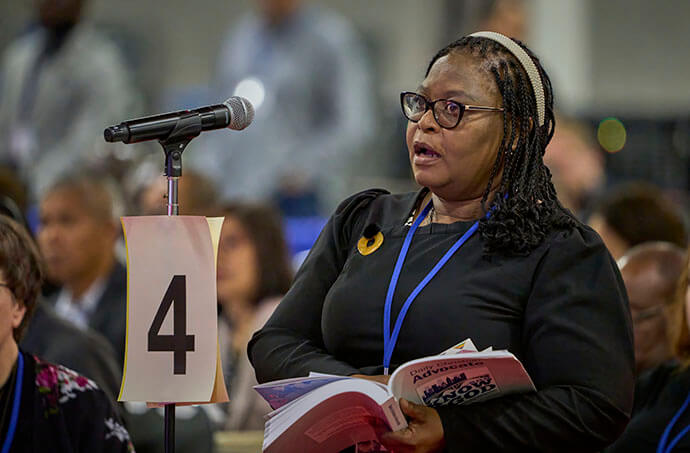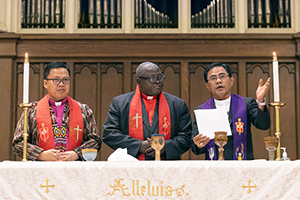Key points:
- General Conference delegates supported a revision of the Social Principles that deletes the phrase “the practice of homosexuality… is incompatible with Christian teaching.”
- The 1972 General Conference added the phrase to The United Methodist Church’s Social Principles, and it has been a source of conflict in the decades since.
- The vote came after about an hour and a half of debate and an amendment to its statement on marriage.
- The historic May 2 vote came after days of General Conference reversing restrictions on LGBTQ ministry without debate.
The United Methodist Church’s condemnation of homosexuality — which sparked a half-century of conflict — is now no more.
By a vote of 523 to 161 after about an hour and a half of debate, General Conference delegates eliminated the 52-year-old assertion in the denomination’s Social Principles that “the practice of homosexuality… is incompatible with Christian teaching.”
In the same vote, delegates affirmed “marriage as a sacred, lifelong covenant that brings two people of faith (adult man and adult woman of consenting age or two adult persons of consenting age) into a union of one another and into deeper relationship with God and the religious community.”
Randall Miller, who chaired the Social Principles Task Force that led the development of the revisions approved over the past week, said this was a historic moment.
“It's been 40 years of work for me and others to remove the incompatibility clause from our Social Principles and really live into our belief that all people are sacred,” said Miller, who is gay and long advocated for the full inclusion of LGBTQ people in church life. “Just deeply grateful and it's wonderful to have come to this moment.”
The historic decision follows days of delegates voting on the consent calendar — without debate — to reverse multiple denominational constraints on ministry with and by LGBTQ members. It marks the beginning of what many see as a new day for The United Methodist Church after decades of rancor over the place of LGBTQ people in the church.
More about Social Principles
The revised Social Principles adopted May 2 replace Paragraphs 161 and 162 in the Discipline, which deal with the church’s stances on the “Social Community.”
“As United Methodists, we affirm that human beings are made for God and for one another (Genesis 1:26-27, 31; Philippians 2:3-8),” the preface says. “We live out our lives, grow in the faith, and engage in acts of discipleship and witness in the context of a variety of interconnected communities, including families, schools, neighborhoods, workplaces, and the broader society.”
Also these Social Principles contain the church’s stance on child marriage, polygamy, divorce, substance abuse, death with dignity, abortion and other topics related to family life.
This section of the Social Principles also acknowledges “that the tangled and complex legacies of colonialism and neocolonialism hang heavily over the global fellowship of United Methodists.”
The section goes on to “call on individuals and congregations to educate themselves about the troubling legacies of colonialism and, where appropriate, to seek repentance for our continued involvement.”
To read the Revised Social Principles
On May 1, in another momentous change, delegates voted by consent calendar to remove the denomination’s ban on the ordination of clergy who are “self-avowed practicing homosexuals” — a prohibition that dates to 1984.
Legislation makes it onto the consent calendar if it received overwhelming support from its legislative committee and has no impact on the denomination’s budget or constitution.
But the vote on this revision of the Social Principles came with debate, and an amendment that delegates adopted from Molly Hlekani Mwayera, delegate from the East Zimbabwe Conference and newly elected member of the denomination’s Judicial Council.
She added the amendment for “a double-barrel definition of marriage" that includes both a man and a woman, in line with law in much of the world including her home country, and two adults, in line with law in other parts of the world including the U.S.
The amendment also weaves in three other parts of the newly adopted Social Principles — the rejection of child marriage, the stance against polygamy and support for consent in sexual relationships.
“We are called to do no harm, do good and stay in love with God,” said Mwayera, echoing Bishop Reuben Job’s summary of John Wesley’s General Rules. “The failure to effectively define the issue of marriage is discriminatory and counter to our Wesleyan tradition.”
She added that United Methodists should be able to have a definition that meets the needs of their context.
But for a number of delegates, a different definition of marriage beyond just man and woman was a major sticking point.
Nimia Peralta, a delegate from the Northwest Philippines Conference, said she must hold with Jesus’ words in Matthew 19 that “a man will leave his father and mother and be united to his wife, and the two will become one flesh.”
“God defined marriage to be between a man and a woman,” she said. “While we celebrate worldwide regionalization, I truly believe the definition of marriage can never be regionalized.”
The Rev. Jørgen Thaarup, a delegate from Denmark, spoke specifically to the amendment. He noted that John Wesley used two different ceremonies for marriage: One for couples who expected to have children, and one for couples who didn’t expect to have children.
“So the thinking that marriage is not just one thing but two things, we have from John Wesley,” he said.
Thaarup also stressed that in Matthew 19, Jesus was addressing a question about divorce, and the Greek word in the passage that is often translated as “man,” could just as easily be translated as human being.

With the vote, delegates have adopted the entire slate of revised Social Principles submitted by the United Methodist Board of Church and Society, the denomination’s social witness agency.
The Social Principles represent the denomination’s public stands on issues of the day and are not church law.
But for many General Conference delegates and observers, the May 2 change to the Social Principles was particularly hard won.
In 1972, delegates were considering a fresh set of Social Principles for their newly formed United Methodist Church — which had just come together in 1968 as a merger between the Methodist and the Evangelical United Brethren churches.
That’s when the 1972 delegates voted to add the words: “We do not condone the practice of homosexuality and consider it incompatible with Christian teaching.” The new statement came after the phrase “persons of homosexual orientation are persons of sacred worth.”
The 1972 General Conference also adopted the statement: “We do not recommend marriage between two persons of the same sex.”
Before that, the Book of Discipline — the denomination’s policy book — said nothing one way or the other about homosexuality.
Subscribe to our
e-newsletter
Since 1972, the denomination’s stance on homosexuality became a recurring subject of debate and protest at each General Conference. The legislative body increased restrictions — changing what was initially a statement of social witness into a matter of church law.
Those added restrictions included banning clergy from officiating at same-sex weddings and banning clergy who are, in the words of the Discipline, “self-avowed practicing homosexuals.” Clergy found guilty of these church-law violations could face loss of credentials or lesser penalties.
The debate culminated with the 2019 special General Conference, which by a vote of 438-384 passed the Traditional Plan that aimed to strengthen those restrictions. In a separate vote, delegates approved a disaffiliation provision, which about a quarter of U.S. churches used to leave the denomination. Most of the departures ended up being theologically conservative churches that supported the bans.
At this year’s General Conference, delegates have been rolling back these restrictions.
The revised Social Principles passed May 2 replace Paragraphs 161 and 162 in the Discipline. Those paragraphs deal with the church’s stances on the “Social Community.”
"The Social Principles are a living document," said Shandon Klein, a delegate for North Texas Conference. She was chair of the Church and Society 2 legislative committee that first supported this section of the Social Principles before it headed to the plenary. "It may not be perfect, as this debate has revealed. But neither are we as living human beings. What we have before us is a grace-filled document that boldly seeks to harmonize mission for our social community."
Before the May 2 vote, General Conference had already adopted most of the revised Social Principles on the consent calendar.
A slate of revised Social Principles came after an international, multiyear process authorized by the 2012 General Conference to develop a “more globally relevant, theologically founded and succinct” version.
Church and Society carried out that effort with a writing team of 52 United Methodists from Africa, Europe, the Philippines and the U.S., who drafted the proposed revised Social Principles. That draft then received input from more than 4,000 United Methodists worldwide before the final submission.
John Hill, Church and Society’s interim top executive, said days before the May 2 vote that his agency’s hope is that the language in all the revised Social Principles will resource and equip ministry in as many settings around the world as possible.
“Around the issues of human sexuality and marriage, we have a church whose local contexts are dramatically different,” Hill said. “So our hope was to have statements that could speak theologically to these matters, but not to any specific context. Instead, they could be applied across contexts.”
Hahn is assistant news editor for UM News. Contact her at (615) 742-5470 or newsdesk@umnews.org. To read more United Methodist news, subscribe to the free daily or weekly Digests.




